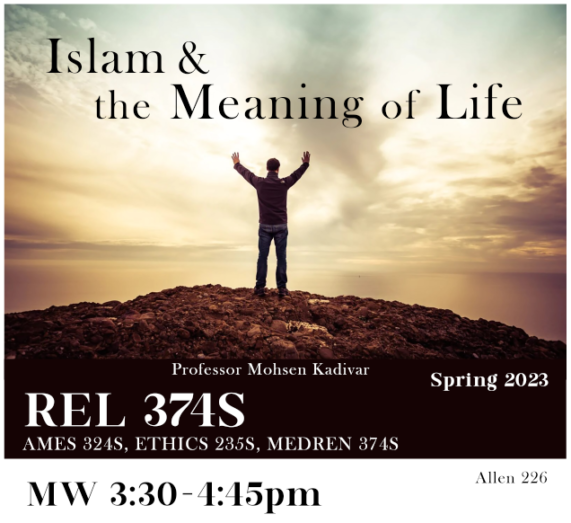
RELIGION 374S, AMES 324S, ETHICS 235S, MEDREN 374S
Islam & the Meaning of Life
Seminar
Spring 2023
M/W 3:30-4:45 PM
Venue: Allen 226
Instructor: Professor Mohsen Kadivar
Course Description
Is life vain, empty, or meaningful? What is the meaning of “Meaning”? What is the meaning of “life”? What does make life “meaningful”? Why are we here? What is life all about? What is the “purpose” of existence? What is the relationship between “well-being”, “good life”, “happiness”, and “virtues” with that purpose? Is the death “end” of human life and we will perish absolutely and be forgotten forever? Is a “universal moral code” necessary for meaning in life? What is the source of “invariant moral rules”?
There have been many proposed answers to these “big questions” from many different philosophical, theological, and scientific perspectives. These answers could be classified into three major approaches: monotheism (and other types of supernaturalism), naturalism, and nihilism (or pessimism).
Monotheistic or Abrahamic traditions are God-centric. Only with God could the deepest desires of human nature be satisfied. The soul is contiguous with one’s body when it is alive and that will forever outlive after its death. “Physical life” is not central to life’s meaning. After discussing the meaning of life in general, and monotheism and the meaning of life in particular, the course focus on “Islam and the meaning of life”. After discussing the similarities of Islam with Judaism and Christianity, the characteristics and benefits of Islam regarding “the meaning of life” will be highlighted.
The range of topics implicated by the “meaning of life” as essentials of Islamic philosophy and theology includes the features of the good life; true happiness; the quest for eternity and not to be forgotten; overcoming loneliness and alienation; tranquility and peacefulness; seeking truth and reducing suffering; living in a purposeful universe; true emancipation; free will; the ultimate purpose of the human life; necessary cause for moral obligations; faith and reason; human dignity; the sanctity of life; the quest for absolute beauty and good; knowing the Beginning and the Return; the observation of transcendence and immanence; the origin of mercy, love, friendship, justice, fairness, and hope; ‘the wholly other’; the exemplar of the human being. We will examine the major Islamic teachings on these vital points of the meaning of life.
Philosophy and theology are two vital components of Islamic studies. Faith, belief, and virtues are its foundations and roots. The three major principles of Islamic theology include God’s supreme unity (and His attributes), the existence of a Next Life, and Prophesy. Different Islamic theological schools such as Ash‘arism, Maturidism, Mu‘tazilism, Shi‘ism, Hanbalism, and a general introduction to the greatest theologians of each school will also be covered during the course. Modern Islamic theology, its methods, subjects, and the ideas of modern scholars will comprise the latter part of the theology section.
The other section of the course ‘Islamic philosophy’ will address the contributions of Muslims to all medieval philosophy. Inspired by Greek philosophers including Plato, Aristotle, and Plotinus, medieval Islamic philosophy came to influence all western philosophy in Latin Europe. We will briefly discuss the major concepts and issues of Islamic philosophy, such as existence and non-existence, quiddity and essence, cause and effect, necessity and probability, matter, motion and time, unity and plurality, eternal and created, attributes of necessary existence, knowledge, and existence, and the human soul. Students will develop familiarity with the three main Islamic philosophical schools— peripatetic, illuminative, and transcendent philosophy— and we will analyze the ideas of major Muslim philosophers such as al-Farabi, Avicenna, al-Gazali, Averroes, Suhrawardi and Mulla Sadra. The course is subject-oriented and thematic in the framework of Islamic theology and philosophy with a centrality on “the meaning of life”. This plan will be implemented through a combination of the course texts, and lecture notes in a seminar format of students’ participation.

